- About
- Visiting
- What’s On
- Venue hire
- Catalogues
- Collections
- 101 Treasures of Chetham’s
- Digital Resources
- The Flowers of Histories
- A Book of Hours from France
- The Manchester Scrapbook
- Thomas Barritt of Manchester
- Art Treasures Examiner of 1857
- Manchester Association for Constitutional Order
- The North Western Museum of Science and Industry: Some Reminiscences by Richard Hills
- Criminal Manchester
- The Cup of Destiny
- Athenaeum Souvenir
- Middle English Manuscripts
- Manchester and Liverpool of Today
- Hollingworth’s Mancuniensis
- Memoir of Cecil Wray
- William Seward’s Diary
- The Anti-Monopolist
- Fishwick’s History of Rochdale
- Knyvett’s Defence of this Realm
- Tractatus de Nigromantia
- Axon Ballads
- Printed Books & Ephemera
- Archives & Manuscripts
- Prints and Photographs
- Blog
- Support us
Robert Rose, the Bard of Colour
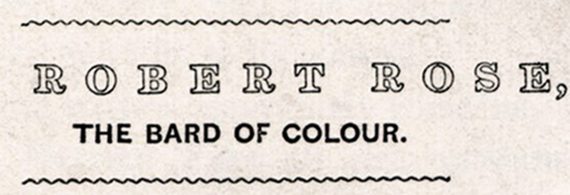
For a brief period in the nineteenth century Manchester’s leading literary watering hole was the Sun Inn, a timber-framed building located opposite the entrance to Chetham’s on Long Millgate. In the early 1840s the upstairs snug bar of the seventeenth-century pub became home to a group of Lancashire writers whose Saturday evening meetings attracted large audiences. So successful were these events that the pub’s landlord took advantage of a branding opportunity and renamed the inn Poet’s Corner, a name that stuck well after the poets had moved on.
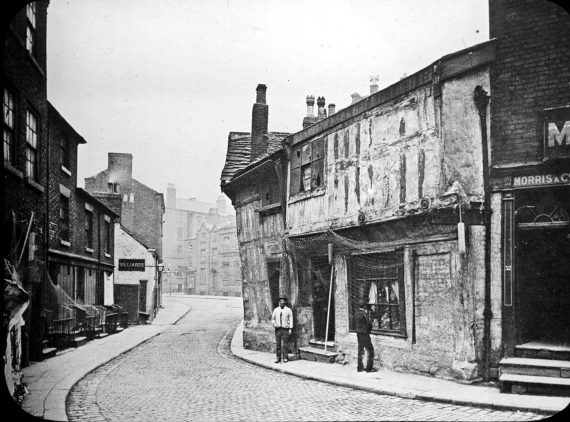
The Sun Inn and ‘Poets’ Corner’
The Sun Inn Group was headed by John Critchley Prince and its members included, among others, the poets Charles Swain, John Bolton Rogerson, Elijah Ridings, and Robert Rose. Of these Robert Rose is the most elusive and least known. Prince was the subject of a long and rather hagiographical work of biography, Charles Swain has made it into the Oxford Dictionary of National Biography, whilst both Rogerson and Ridings saw their poems published as collections during their lifetime.
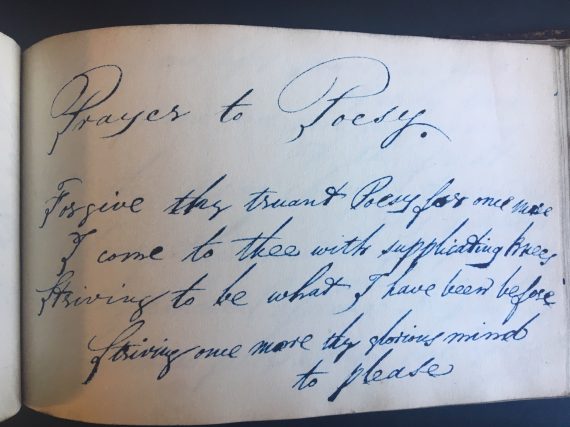
The opening lines of Rose’s ‘Prayer to Poesy’
Robert Rose’s reputation however remains low and yet he was a striking figure who does not deserve to be entirely forgotten. He was a native of the West Indies but details of his early life are obscure. It is believed that he came over to Manchester as a child and eventually he came to live in St Stephen’s Street in Salford. Unlike his fellow poets who were working-class and who had other occupations to make ends meet, Rose was described a wealthy gentleman with sufficient leisure at his disposal to take up poetry. Most of his verses appeared in newspapers but he did bring out The coronation : a poem. With reflections on the occasion. Dedicated to Her Most Gracious Majesty Queen Victoria, and The bazaar, a poem : embracing thoughts on the progression of knowledge in connection with it, and he was a contributor to The festive wreath : a collection of original contributions read at a literary meeting, held in Manchester, March 24th, 1842, at the Sun Inn, Long Millgate.
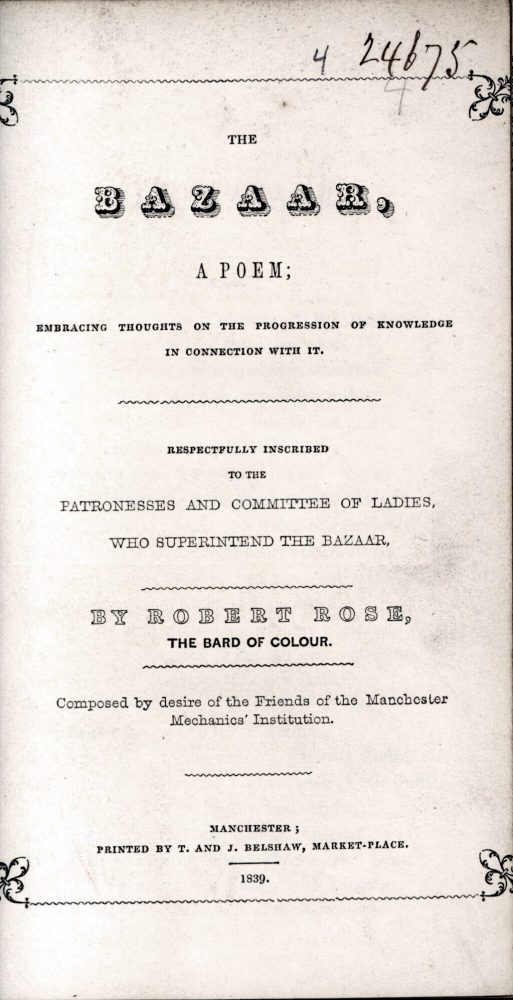
‘The Bazaar’
Rose’s works were published with his name and with the epithets ‘the bard of colour’, or ‘a West Indian of colour’ and he is possibly the only published black poet to reside in Manchester in the C19th. He was by no means a great poet, although he was not untalented and showed a fondness for the sonnet. He was a generous and kind man, a good companion to his fellow writers. But as a black man in mid C19th Manchester and Salford he was a victim of the casual racism that saw black people as figures of fun and as the butt of jokes. He often failed to finish works and his major piece, ‘The Ocean’ was one of those poems destined never to be published. This resulted in a practical joke, played by his supposed friends Prince and Rogerson who placed an advertisement in the papers, ’Shortly will be published The Ocean – a mystery. By A Black, London: Blackwood; Glasgow: Blackie; Edinburgh: Black.’ Rose is said to have accepted this with infinite good humour but he was probably not in a position to complain.
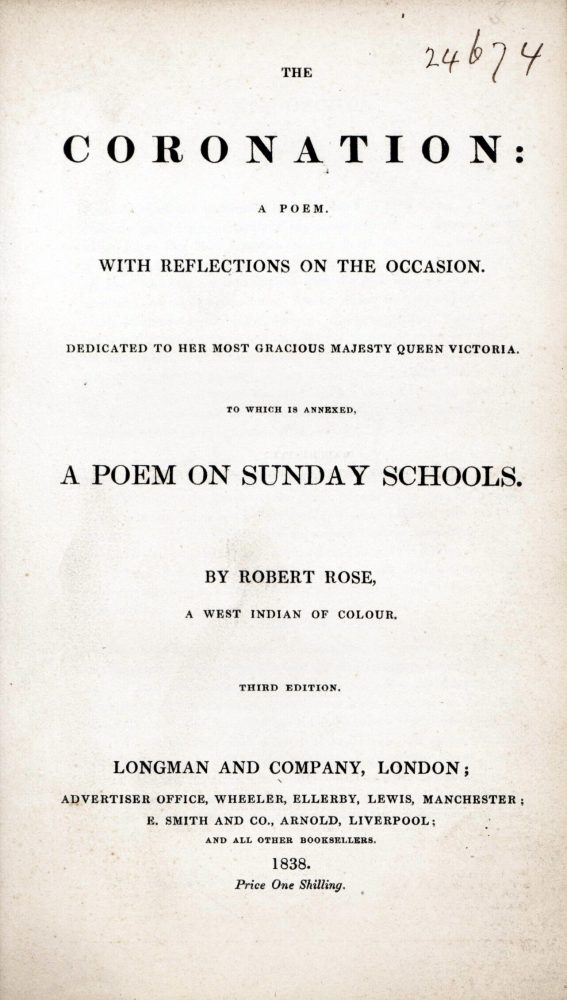
‘The Coronation’, Rose’s salute to the new Queen
Rose’s death is problematic. It appears that he died in a police cell, having been arrested a few hours earlier for drunkenness. This was not enough: Rose was described not simply as being drunk but having consumed ‘an incredible quantity of alcohol’ before suffering the DTs and then expiring. Whatever the precise cause of death, he was buried in Manchester General Cemetery at Harpurhey on 21st June 1849 and his gravestone was inscribed with the following verse:-
“I’d rather have my tomb bedew’d at eve
With the lone orphan’s or the good man’s tear
Who softly stole at twilight here to grieve
And sobb’d aloud — the friend of man rests here
I’d rather have this quiet humble fame
Than hollow echo of an empty name”.
The Library is fortunate to have Rose’s manuscript of his poems, a slim volume of 50 leaves that contains most of his works. In Black History Month the life of Robert Rose, a black writer in industrial Manchester, is well worth celebrating.
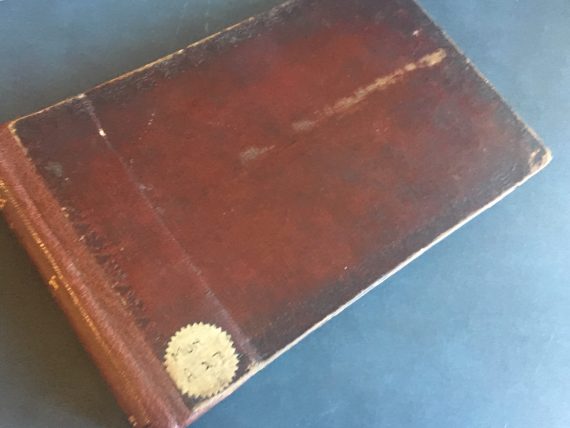
The manuscript of Robert Rose’s poems at Chetham’s Library

28 Comments
Mack
excellent !
ferguswilde
Thanks, Mack!
michael Kelly
Dear Sir , Madam
I am a direct ancestor of John Bolton Rogerson. He was reputed to be a kind and religious man and so I was surprised he played a joke on Mr. Robert Rose , a remarkable man. I wish to apologize to Robert for this lapse in my ancestors usually kindly spirit . I have tried to research Robert Rose and indeed all the Sun Inn poets , they should be commended for their Light that shone for a while in a dark Manchester.
Many thanks for your work.
ferguswilde
Thanks, Michael. I’m glad you found this interesting. It’s always going to be uncomfortable to confront the attitudes of previous ages, but we can celebrate Rose today.
Jeanne Carmont
I am a member of
The Manchester General Cemetery transcription project,
We have been photographing and transcribing all gravestones in the cemetery for eight years and it is an ongoing project, I have been researching all our poets from this era, am most interested in Robert Rose, would love to see this book.
ferguswilde
Dear Jeanne, you’d be welcome to see it. You can see our opening hours and contact details on our website at http://www.chethams.org.uk/, though NB we’ll be closed for the Christmas vacation shortly. Please ring us or email with a proposed time and we can book you in.
Judith Brown
In sorting through the effects of my late father I came across a battered album of a Victorian lady. There are many poems inscribed in from various contributors, signed only with initials and difficult to read. However, there are three loose leaf poems signed R. Rose. On the reverse of one of these someone has written ‘By Robert Rose, the Bard of Colour. I decided this was worth researching and came upon this blog and was able to match the hand-writing. I would love to make an appointment to see the manuscript held at the library and I wonder whether you would accept the ones I have into your keeping. They are very fragile and should be kept in better conditions than I can provide at home. I would also be interested in finding out if any of the other people who have inscribed poems in the album have connections to the Sun Inn Group.
If any of this is possible, can you let me know who I should contact at the library to organise a visit?
Mike Ince
Amazing, just heard the radio 4 poets programme, thank you I csn’t wsit to visit.
ferguswilde
Thanks, Mike! Credit goes to Testament and Nija Dalal-Small, the producer, of course; bud do visit us too!
Elizabeth Oddy
i wish i had known about this man when i lived in manchester where i was born. i really think he should be celebrated and published more. i am over eighty so remember poets corner but never new why it was called that.
Hannah Clifton
So interesting to read this. I’ve just heard about Rose on the radio 4 programme. I so hope that Robert Rose and his fellow Sun Inn poets now gain greater prominence and we can all read their work. Thanks to all involved.
ferguswilde
Thanks, Hannah, glad to hear you enjoyed the blog, and the Radio 4 programme too. We’re hoping to play host to Testament here shortly for a talk on Rose – we’ll announce it in our newsletter (you can subscribe at the bottom of this page, only about one a month) and on our ‘What’s On’ page. Several people are working on Rose at the moment, so we can hope for more on his under-explored life.
Diana Peschier
I would love to read R Rose’s poem on Sunday Schools as I have made a study of them. Is it possible to see a copy without visiting your library?
ferguswilde
Thanks, Diana, we’ll look into it …
Judy. Cooper
So good to find out about Robert Rose.
The more we know about different poets the better it will be I hope , For our society
ferguswilde
Thanks, Judy – very much in agreement!
Susan lear
Just listened to the Radio 4 programme and had to stop my decorating to listen. Would love to have heard more of his poems read. Susan
ferguswilde
Thanks, Susan – we’re hoping to organise a reading, please see the answer to Hannah’s comment above.
Mark Woodgate
Is there an anthology or collection of his works available as a reprint at all?
ferguswilde
Hi Mark, I don’t think there is at present – perhaps time there was! I’ll ask around.
Michael Wemms
Is it possible to see a transcript of ‘The Ocean’ ?
I believe it was never published, but would be interested in reading it
ferguswilde
Thanks, Michael – as far as I know, it was not only unpublished, but unfinished. I don’t believe there is a coherent draft of it, though I’d be very happy to be proved wrong bay anyone who knows better.
Simon Cunningham
Listen to the BBC radio program TESTAMENT TO ROSE for an appreciation of the man’s life and work by Manchester rapper and poet Testament. Black lives matter.
Joe Barry
A fascinating story, so warmly told on Radio 4 (Repeat) tonight. Ancestors of my mum (nee Richardson) were chemical manufacturers (salters & dyers?) on the Salford side of town back then. Congrats to Jeanne and the Cemetery transcription project – how wonderful to be able to uncover an inscribed stone ! Looking forward to the Testament talk (TBA). Keep up the good work, everyone, xxx
ferguswilde
Thanks, Joe, yes, all credit and thanks to Jeanne and friends for protecting and cultivating Rose’s memory. Stay tuned for a talk here by Testament, we’re working on a date. You can find out what we’re up to on https://library.chethams.com/whats-on/ and we’ll advertise it on Twitter etc.
Ra Hendricks
Robert Rose has indeed been sadly hidden from British, and Caribbean, history! Just happened to be listening to BBC R4 to hear the featured presentation by Testament and believe he deserves full praise in bringing the life of this Ancestor to light! Manchester boasts the 1945 5th Pan-African Congress in Chorlton Town Hall as a significant milestone in the historical narrative of its Black community! Ras Makonnen, another native of the then British Guiana, was one of the key coordinators and a successful businessman residing in Manchester in the 1940s! I doubt if even he would have been aware of another, born in El Dorado, who had made his mark more than a century before in the north of England? Suggest a celebratory assembly on June 19 honouring Robert Rose to mark the 175th anniversary of his death! Well done Chetham Library!
Camilla Winn
I heard the Radio 4 programme last night by chance. Having not heard of Robert Rose before, it was very illuminating andwould very much like to come to the library to read the poetry of the very gifted Robert Rose.
ferguswilde
Thanks, Camilla – glad to hear you enjoyed the programme. You can find our Rose material on our catalogues at https://library.chethams.com/catalogues/ – a search in the printed book catalogue for Robert Rose under the Author heading of the Advanced Search will bring up what we have of his published work. Quite a few of his works appeared in newspapers, which we don’t have here. Arrangements for coming to visit to see the library, and for coming as a reader, are at https://library.chethams.com/visiting/, and you can find contacts for us at https://library.chethams.com/about/contact-us/